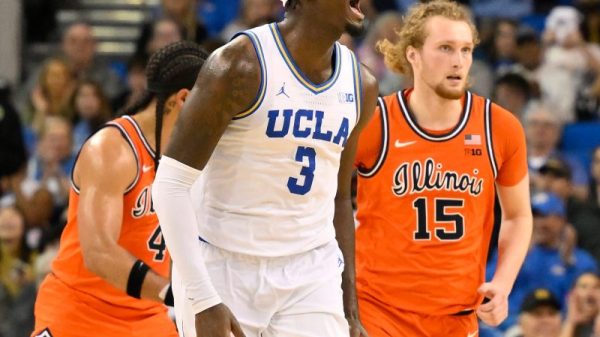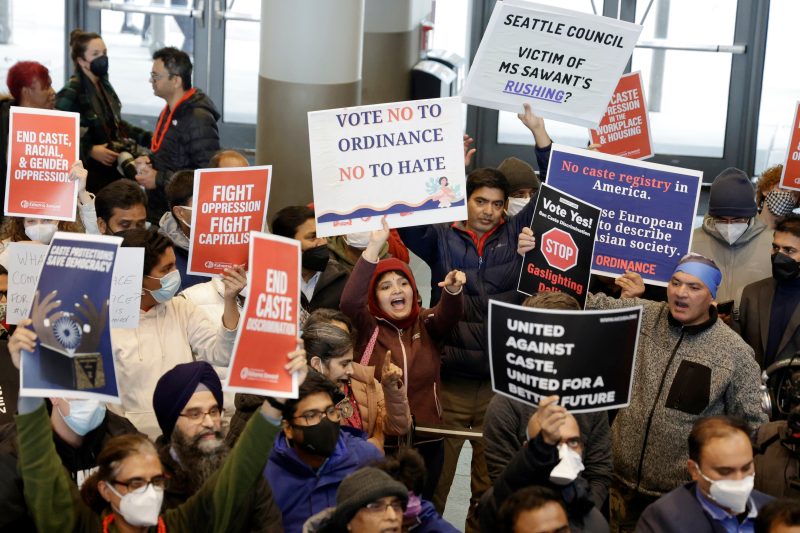Shortly after Democratic lawmakers in California this fall passed the first state ban on discrimination by caste, a prominent Indian American party fundraiser says, he confronted Gov. Gavin Newsom with a stark warning.
If Newsom signed the bill, he would alienate and lose the support of Indian American donors and voters, Ajay Jain Bhutoria, a former deputy co-chair of the Democratic National Committee, said he cautioned Newsom.
“We used very strong words … telling him that definitely he has a bright future in the national politics and he has a bright, bigger ambitions and the community would love to support him,” Bhutoria said in an Oct. 8 interview on X Spaces, formerly Twitter Spaces, the day after the veto. “But at the same time, if there’s a mistake made on his side, he loses the support of the community. And I think he got the message very loud and clear.”
Newsom vetoed the bill on Oct. 7, weeks after Bhutoria and another high-profile Indian American Democratic donor, Ramesh Kapur, spoke to him at a Democratic National Committee retreat in Chicago, they said.
The governor’s decision has cast into stark relief a growing rift within the Democratic Party among Indian Americans — an increasingly important demographic in the party — over the movement to prohibit discrimination by castes, the rigid system of social hierarchy traditionally linked to Hinduism.
California’s caste anti-discrimination bill was the culmination of a recent wave of bans across the country, mostly pushed by Democratic lawmakers and liberal activists. Two cities, Seattle and Fresno, Calif., made caste a protected class this year, and several universities, including the 23-campus California State University System, have also created special caste-based protections for students and faculty.
Caste is a fixed social group that people are assigned at birth and that traditionally dictates opportunities for jobs, education and marriage. In India, the caste system originally applied to Hindus but now covers people of various religions. Because of this, the California bill ultimately took out all references to Hinduism.
Newsom’s office said that in addition to meeting with Bhutoria and other opponents, he also met with bill supporters, and that he believed that the state’s anti-discrimination laws already covered castes.
“The Governor met with a number of people on both sides of this issue,” said Erin Mellon, a Newsom spokesperson. “He made his decision because it would be duplicative with existing state law, as stated in the veto message.”
But supporters of the measures, including the American Bar Association and some Hindu civil rights groups, say that Newsom is incorrect and that people from lower castes are routinely losing educational, housing and job opportunities when someone from an upper caste learns of their status.
“Current laws do not provide adequate protections against discrimination that follows people from a lower caste,” said Tarina Mand, a lawyer and past president of the South Asian Bar Association of San Diego. “The beauty of America is that we pride ourselves on the notion that if you work hard enough, you can work your way up, but caste is not something you can shed.”
The rise of the caste bills has led to a nascent opposition movement within the party, culminating in Newsom’s veto and the formation this year of a mostly Democratic 27-member congressional caucus, led by politicians who have publicly opposed caste discrimination bans at the state and federal level.
Detractors of caste anti-discrimination laws — including many Indian American big-money donors and political power players — say the bills could fuel rather than curtail discrimination against South Asians, particularly Indian Hindus, because they are most often associated with caste hierarchy. They argue that the measures could falsely characterize all Hindus in America as inherently biased against members of their own community. They also said the laws could make people who belong to an upper caste — or whose surnames suggest they do — targets of frivolous lawsuits.
“They are trying to divide us among different castes and different classes,” said Romesh Japra, who founded the Americans 4 Hindus super PAC and recruited Bhutoria and other Democratic Indian American donors to fight the bill. “We came here to this country, to America, and we did not think that we’ll have to face this again.”
Japra said that during his 50 years in the United States, he has never experienced or seen any caste discrimination. “It doesn’t exist,” he said.
Ananya Chakravarti, a Georgetown University history professor and expert on the caste system, said this is a common refrain from wealthy American Hindus who are not from a lower caste.
“It would be a lot like White people standing up and saying they have never experienced race discrimination,” said Chakravarti, who is from an upper caste. “It’s literally a case of the upper caste trying to speak for the entire community.”
The measures, which are in part dividing Indian Americans along socioeconomic lines, present a challenge for the Democratic Party. Indian Americans have been a reliable voting bloc for the party, backing President Biden by 74 percent in the 2020 election, but the GOP has seen an opening with two Indian American presidential contenders this year in Nikki Haley and Vivek Ramaswamy.
“The politicians are trying to navigate something that is complex,” said Guha Krishnamurthi, a law professor at the University of Maryland who is an expert on the caste system. “They want to do the progressive liberal thing, but at the same time, they don’t want to alienate groups that believe this may denigrate Hinduism.”
Donors like Kapur said they are committed to working with Democrats who backed the anti-caste discrimination bills to ensure there is no party fracturing over the issue. Kapur pledged to speak to liberal Democrats, who supported the bill and similar caste discrimination measures, in defense of Newsom to help them see “the bigger picture.” He said he has promised to raise funds for the governor.
But Fatima Iqbal-Zubair, chairman of the California Democratic Party’s progressive caucus, said Newsom’s veto was a disheartening blow for the state party, which endorsed the bill. Pictures of Newsom meeting with the wealthy Indian donors who were fighting the bill have infuriated members of the caucus and grass-roots supporters, she said.
“Not surprisingly, those with money, with privilege in the community, who risk losing access to that privilege, were the ones fighting the bill,” said Iqbal-Zubair, who is South Asian. “The caste system is very real and, ironically, this dynamic played out here. It wasn’t people at the bottom he was meeting with; it was people at the top. He listened to them, to the wealthy donors.”
Debates over caste discrimination in the United States began to surface in the 1980s and 1990s, in part because of affirmative action laws in India that allowed people from lower castes to secure college educations, often in technology fields, which prompted many to immigrate to America for work.
“These weren’t people who came over to drive taxis,” said Deelip Mhaske, whose nonprofit, Foundation for Human Horizon, works against caste discrimination. “These were highly educated people who thought they escaped caste discrimination, but it followed them.”
Many found that their bosses in America were upper-caste Indian immigrants who sometimes discriminated against them, said Mhaske, who is a Dalit, a lower Indian caste whose members historically were called “untouchables.”
The California Civil Rights Department filed a lawsuit in 2020 in state superior court against the technology company Cisco Systems after two high-caste Indian managers allegedly discriminated against a low-caste engineer. Cisco has denied the claims. The case, which could create case law that provides caste-based protections, is pending.
Some lawmakers and college boards began to take notice, particularly in locations where the technology sector and the South Asian population were large and growing.
California state Sen. Aisha Wahab (D) heard last year on the campaign trail from members of the Dalit caste telling her they were facing workplace discrimination. She introduced a bill in February to add caste to the list of characteristics protected by state civil rights, fair housing and education laws.
“This bill is about workers’ rights, women’s rights and civil rights,” she said. “This bill is about ensuring the American Dream is accessible to all those who pursue it.”
Dalits and groups representing them testified and staged a 30-day hunger strike in front of the California Capitol. Hundreds submitted written testimony, including Prem Pariyar, a social worker from Nepal. Pariyar said he came to the United States in 2015 to escape caste violence, finding work at a South Asian restaurant. However, he said, he soon faced retaliation.
“I faced casteist slurs from my co-workers, harassment, wage theft, and ended up being homeless living in a windowless van,” Pariyar said in his written testimony.
Pushback to the bill was immediate from some moderate and conservative Hindu American advocacy groups. Wahab and her staff say she received racist messages and violent threats. And the hours-long legislative hearings that followed became heated as proponents argued that the bill was an important civil rights measure while opponents argued that it was racist and discriminatory.
“Everyone has a race. Everyone has a color. Everyone has an age,” said Rakhi Israni, a lawyer and an executive director at the Hindu Policy Research and Advocacy Collective USA, which argued that the law would be discriminatory. “Not everyone has a caste.”
The bill overwhelmingly passed the State Assembly, 55-3, in August and the Senate, 31-5, in September. Republicans who voted for the bill spoke of their own families’ immigration stories and the prejudice they faced. “My family changed their name at Ellis island when they came over to avoid discrimination,” said state Sen. Scott Thomas Wilk Sr. “In America, we are supposed to all be created equal.”
Wahab and her allies celebrated the victory. But as the bill headed to Newsom’s desk, a group of wealthy Indian Americans began a pressure campaign focused on the governor.
Kapur, a member of the Biden-Harris National Finance Committee in 2020, said he wasn’t following the bill closely until it passed the legislature. “I was just concentrating on raising money for Biden, for his reelection,” Kapur said in an interview.
Speaking on a Hindu television show broadcast on YouTube, Kapur said Japra pulled him into the debate. Kapur said he then reached out to Vice President Harris, whose mother was Indian American.
“The White House played a little part in also supporting this,” Kapur said in the interview on YouTube. “If Japra did not send me that information and I didn’t go to Kamala D. Harris … this bill would have been signed.”
In an interview with The Washington Post, Kapur backed away from the claim that he solicited and secured Harris’s help, saying, “If I said that, I misspoke.” A Harris spokesperson did not respond to calls and texts seeking comment.
Then in September, Kapur and Bhutoria said, they approached Newsom at a Democratic National Committee meeting in Chicago and told him their concerns about the bill. In interviews with The Post, both men said they misspoke in their later claims that they directly threatened Newsom with a loss of donations if he signed the bill. Instead, Kapur said, “I let him know he has competition. He can’t take our support for granted.”
Kapur said Newsom pointed out to him that the bill had passed with almost unanimous support of the Assembly and Senate. “I said, ‘I know that, but I would like you to veto it,’” Kapur said in an interview. “He said some would go after him in large numbers. I told him I would have his back.”
In his interview with The Post, Kapur said that he exchanged emails with Newsom after he spoke with him in Chicago and that Newsom emailed him hours before the veto.
“He is a good politician, so he emailed me: ‘Will veto and just watch my back,’” Kapur said describing the email, which he would not share with The Post. Newsom’s office did not respond to questions about whether he emailed with the men. “He is moving away from all the fringe bills that are before him because he wants to move into middle left as opposed to far left,” Kapur said. “Now he has a big supporter in us.”
Bhutoria posted a picture of Newsom and himself at the DNC event in Chicago hours after the veto, saying, “Thank you Gov. Newsom for listening to my recommendation.”
Although Newsom’s office said he met with people on both sides of the issue, officials from Equality Labs — a bill sponsor that organized testimony from lower-caste Dalits and led the hunger strike — said they repeatedly asked and were never given a meeting with Newsom or his staff. Newsom’s office did not directly respond to questions about whether it met with Equality Labs or Dalit activists. Wahab and her aides met with Newsom’s staff but were not given a one-on-one with Newsom, Equality Labs said.
“It is apparent that the governor vetoed the bill due to political pressure by Hindu organizations and financial donors,” said Ann Ravel, a California lawyer who served on the Federal Election Commission during the Obama administration and who supported the bill.
Meanwhile, Japra said, the California bill and the success of Seattle’s and Fresno’s anti-discrimination caste measures prompted him to take his work against such laws to Congress. Japra and his PAC — which formed in 2019 and exclusively supported Republican candidates until last year — helped organize a “Hindu-American Summit for Political Engagement” at the U.S. Capitol in June.
By this fall, his group had helped organize the new Hindu, Jain, Buddhist and Sikh American Congressional Caucus, which claims 27 members, all but two of them Democrats. In an interview, Japra said the group is sympathetic to his concerns about a possible federal caste discrimination law, adding that caucus members will now serve as “our mouthpieces and spokesmen” to block such actions.
Rep. Richard McCormick (R-Ga.), a leader in the new caucus, said in a statement against the California bill that he believed “it’s racist and it classifies people in a divisive way.” McCormick did not return calls seeking comment. The head of the caucus, Rep. Shri Thanedar (D-Mich.), said in a statement to The Post that “any legislation based around caste unfairly stigmatizes the South Asian and Indian American community.”
A group of mainstream Hindu and Sikh organizations protested the new caucus, saying it was formed without “input from the full spectrum of Hindu American civil society, including Dalit” organizations.
“Any caucus without inclusive representation from the Indian diaspora will serve as nothing more than a vehicle for Hindu nationalist policies that will inevitably harm the entire South Asian American community,” the group, which includes Hindus for Human Rights and the Sikh Coalition, said in an Oct. 3 statement.
In a statement to The Post, Thanedar defended the caucus, saying it would promote the interests of Hindus, Buddhists and Sikhs across the nation. ‘These communities often face discrimination, cultural misunderstandings, and limited access to resources, all factors that hinder their complete integration in American society.”
It’s unclear where efforts to ban caste discrimination will go in California after the veto. Wahab’s office said it is no longer commenting on the bill.
Dalit activists that supported the measure said violent threats from opponents have caused Wahab and others who are pushing for caste discrimination measures to retreat.
Last month, a conference in Berkeley, Calif. — where speakers were scheduled to talk about caste discrimination in the United States — was canceled by event organizers because “those pushing for caste equity, including our guests, have been met with threats and harassment.”
Against this backdrop, several state legislators in New Jersey, which has the largest South Asian population in the nation, are planning to introduce bills early next year to address caste discrimination, according to some grass-roots organizations involved in the planning. “There are firm plans in place but, given the current climate, they want to wait until January to make any announcements,” Mhaske said.
It’s unclear whether a congressional bill will be introduced. The latest action on Capitol Hill was a resolution that denounced caste discrimination, introduced by Rep. Ilhan Omar (D-Minn.) in June when Indian Prime Minister Narendra Modi visited the Capitol. It did not pass.
Alice Crites contributed to this report.



























